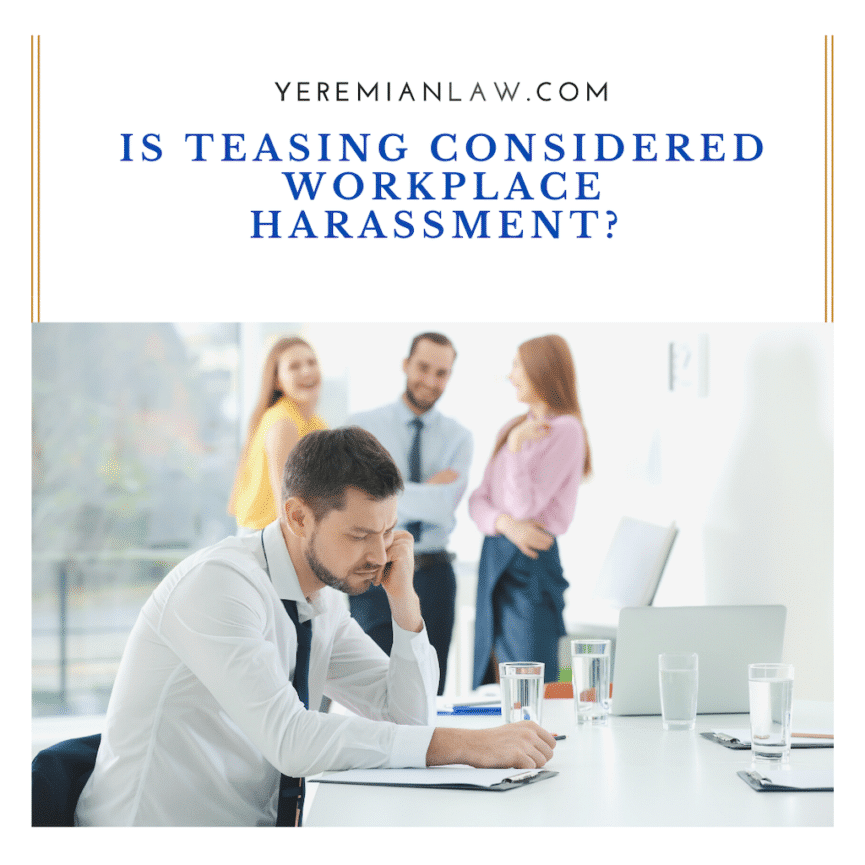Friendly teasing and joking in the workplace may occasionally happen between employees, or even between employees and supervisors. Acceptable joking and poking fun, however, can cross the line and become harassment.
What is Simple Teasing?
The question of workplace harassment revolves around whether or not a behavior is “simple teasing” or something more. Simple teasing can be about anything from a funny moment, to simple jokes—neither of which, in theory, impede a person from performing their job responsibilities. Teasing someone once or twice isn’t enough to constitute harassment.
What is Harassment?
Harassment is having to tolerate offensive behavior as a condition of continued employment, or when conduct is severe or pervasive enough to create a work environment that a reasonable person would consider intimidating, hostile, or abusive.
Harassment must always, however, involve a protected class, and possibly prevent a person from doing their job.
What is a Protected Class?
A protected class (or protected group) is a category by which people qualify for special protections by a law, or similar authority, and is frequently used when referring to employees and employment.
Federal protected classes include: race, color, religion or creed, national origin or ancestry, sex (including gender, pregnancy, sexual orientation, and gender identity), physical or mental disability, age, and Veteran status.
3 Types of Harassment
Harassment falls within three categories: verbal or written, physical and visual.
Verbal and Written Harassment
Verbal and written harassment are perhaps the most obvious and common examples of workplace harassment, and can include: emails with offensive jokes or graphics about race or religion, repeated requests for dates or sexual favors in person or through text, asking about family history of illnesses or genetic disorders, derogatory comments about someone’s disability or age, and imitating someone’s foreign accent behind their back.
Physical Harassment
Physical harassment can be subtle or overt. For instance making lewd hand gestures, or other gestures, meant to convey curse words, making sexually suggestive facial expressions, unwanted touching, frequently following or standing too close to a person on purpose, or playing music with offensive or degrading language.
Sometimes these actions do not have to be directed at a particular person to be considered harassment. For instance, if two coworkers are fraternizing and one makes an inappropriate hand gesture and someone else sees it, that person might feel uncomfortable and even harassed.
Visual Harassment
Visual harassment is the most subjective type of harassment. It can include wearing clothes with offensive or vulgar language, displaying posters or pictures that are sexual in nature, showing sexually suggestive text messages or emails, watching pornographic or violent videos, and drawing violent or derogatory images.
An example of visual harassment is someone who might have a comic strip displayed at their workstation, which most people find to be funny. Someone else, however, may think it’s offensive and that it’s creating a hostile work environment.
Anyone Can Be the Harasser
Anyone can be the harasser in a work environment—a supervisor, CEO, others in a position of authority over you, as well as your work peers, clients, and customers. Harassment doesn’t have to come from your superiors in order to be considered harassment. A power imbalance does not have to exist.
Can You Work for Your Employer During a Harassment Suit?
It’s possible for you to sue your California employer while still working for them. You don’t have to quit your job while you seek justice.
A lawsuit, however, is very likely to upset your employer and could lead to mistreatment and heavy and unfair scrutiny from others. You may even be illegally terminated from your position.
In California it’s illegal for your employer to fire you for suing them in good faith. This is considered workplace retaliation. Although it’s illegal, your employer may still choose to fire you for filing a suit, so it’s important to be prepared for that likely outcome.
Do You Need to Talk to an Attorney About Harassment in Your Workplace?
If you believe you’ve been harassed in your workplace, we may be able to help you. Call us at 818-230-8380 or fill out the form below to schedule your free consultation with an experienced attorney now.




